Hamas has said it rejects "new conditions" in a Gaza ceasefire plan the United States presented after two days of talks with Israeli negotiators in Qatar.
As international pressure mounted for a ceasefire after more than ten months of war between Israel and Hamas in Gaza, US President Joe Biden said: "We are closer than we have ever been."
"I don't want to jinx anything ... we may have something. But we're not there yet," he added.
US Secretary of State Antony Blinken is to travel to Israel this weekend to advance the latest proposal, the US State Department said.
"Secretary Blinken will underscore the critical need for all parties in the region to avoid escalation or any other actions that could undermine the ability to finalise an agreement," it said.
Washington has joined its European allies in pushing for a swift ceasefire in Gaza since the 31 July killing of Hamas political leader Ismail Haniyeh in an attack in Iran blamed on Israel prompted threats of retaliation and fears of a wider Middle East war.
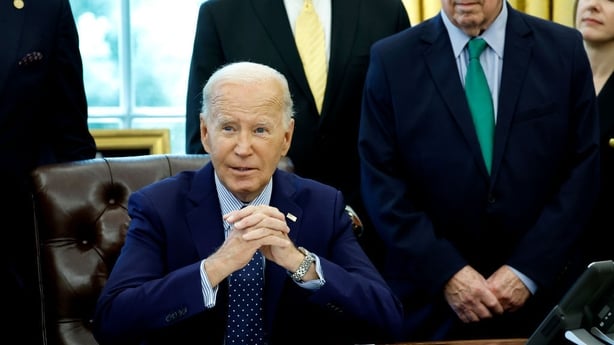
Egyptian, Qatari and US mediators have been seeking to finalise details of a framework initially outlined by Mr Biden in May, and which he said Israel had proposed.
But months of talks have so far failed to pin down the details of a truce and hostage release deal.
The mediators said that the two days of talks in Doha were "serious and constructive".
In a joint statement, they said the US had presented a "bridging proposal" that sought to secure a rapid deal at a new round of talks in Cairo next week.
Hamas swiftly announced its opposition to what it called "new conditions" from Israel in the latest plan.
Israeli Prime Minister Benjamin Netanyahu called on the mediators to put "pressure" on Hamas "to accept the May 27 principles", referring to Mr Biden's framework.
Western ally Jordan however put the blame squarely on Mr Netanyahu for blocking a deal.
"He must be directly and effectively pressured by everyone who wishes to see this through to completion," Jordanian Foreign Minister Ayman Safadi said.
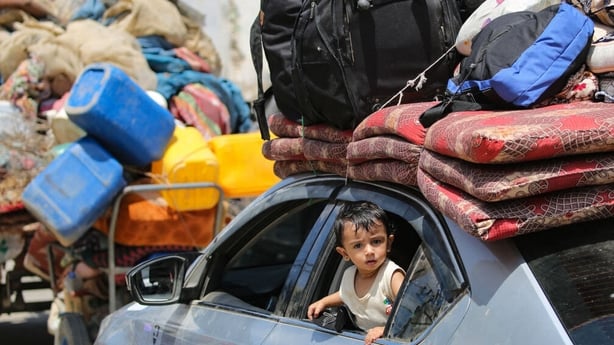
An informed source told AFP that the conditions Hamas objected to included keeping Israeli troops inside Gaza along the territory's border with Egypt, veto rights for Israel on the Palestinian prisoners to be exchanged for Israeli hostages, and the ability to deport some prisoners rather than send them back to Gaza.
Diplomatic pressure on Israel to agree a truce has increased in recent weeks.
Hamas officials, some analysts and protesters in Israel have accused Mr Netanyahu of prolonging the war.
British Foreign Secretary David Lammy and his French counterpart Stephane Sejourne held talks in Israel today to urge a Gaza ceasefire.
Britain's foreign ministry said the two ministers would "stress there is no time for delays or excuses from all parties on a ceasefire deal".
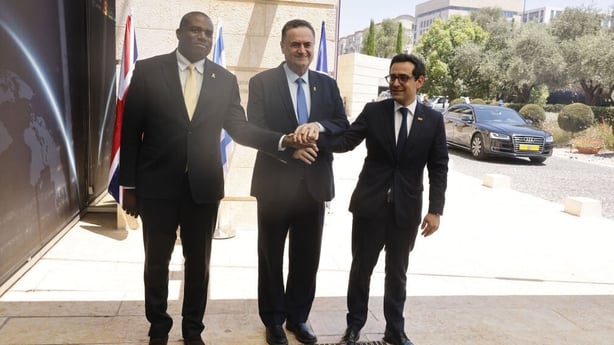
Israeli Foreign Minister Israel Katz told his visiting counterparts he expects foreign support "in attacking" Iran if it strikes Israel in revenge for Haniyeh's killing.
Mr Sejourne replied that it would be "inappropriate" to discuss responding to any attack while diplomacy is in high gear to stop it happening.
A senior US official, speaking to reporters on condition of anonymity, said Iran would face "cataclysmic" consequences if it strikes Israel.
The conflict began on 7 October when Hamas fighters rampaged into Israel, killing around 1,200 people and seizing around 250 hostages according to Israeli tallies.
Israel's military campaign has reduced much of Gaza to rubble and killed more than 40,000 Palestinians, mostly civilians, according to Palestinian health authorities. Israel says it has eliminated 17,000 Hamas fighters.
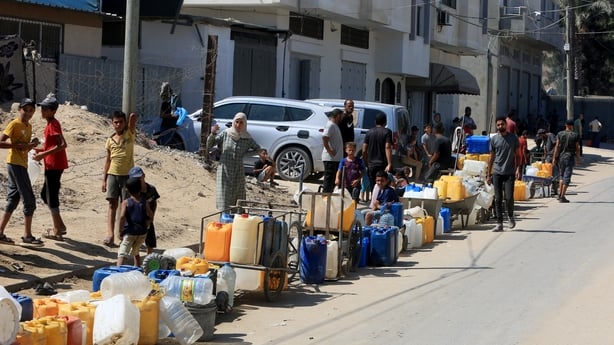
Earlier, the Israeli army ordered a fresh evacuation of areas in southern and central Gaza previously designated as a humanitarian safe zone, saying the areas had been used by Hamas as a base for firing mortars and rockets towards Israel.
It said warning flyers and text messages had been sent out in the area north of the southern city of Khan Younis and in the eastern part of Deir Al-Balah, where tens of thousands of people have sought shelter from fighting in other parts of Gaza.
"The advance warning to civilians is being issued in order to mitigate harm to the civilian population and to enable civilians to move away from the combat zone," the military said in a statement.
The United Nations is asking for a seven day ceasefire to vaccinate more than 640,000 children against polio, which has been discovered in the territory's wastewater.
UN agencies want to provide the novel oral polio vaccine type 2 (nOPV2) to children under ten starting later this month, the World Health Organization (WHO) said.
"Without the humanitarian pauses, the delivery of the campaign will not be possible", it added.
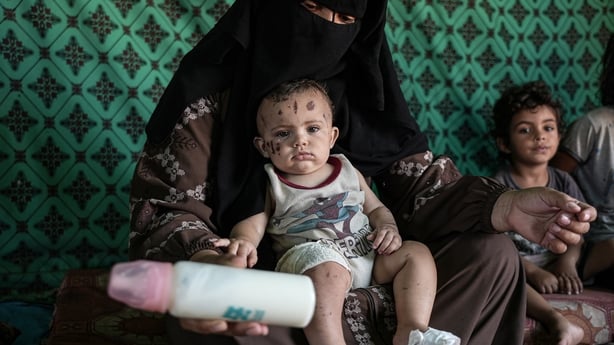
In a statement late last night, Hamas politburo member Hossam Badran said Israel's continuing operations were an obstacle to progress on a ceasefire.
The Israeli delegation included spy chief David Barnea, head of the domestic security service Ronen Bar and the military's hostages chief Nitzan Alon, defence officials said.
The White House sent CIA Director Bill Burns and US Middle East envoy Brett McGurk. Qatari Prime Minister Sheikh Mohammed bin Abdulrahman Al Thani and Egypt's intelligence chief Abbas Kamel were also taking part.
Read more:
Latest Middle East stories
'Dehumanising' conditions prevent aid being delivered to Gazans - ICRC
With US warships, submarines and warplanes dispatched to the region to defend Israel and deter potential attackers, Washington hopes a ceasefire agreement in Gaza can defuse the risk of a wider war.
Republican US presidential candidate Donald Trump said yesterday that he had told Mr Netanyahu during their last meeting in July to quickly end the Gaza war, but the former president also criticized ceasefire demands.
We need your consent to load this rte-player contentWe use rte-player to manage extra content that can set cookies on your device and collect data about your activity. Please review their details and accept them to load the content.Manage Preferences
"He knows what he's doing, I did encourage him to get this over with," Mr Trump told reporters at a press conference yesterday.
"It has to get over with fast. ... Get your victory and get it over with. It has to stop, the killing has to stop," he said.
Mr Netanyahu's office and Mr Trump both separately denied yesterday an Axios report that said they had spoken the previous day about Gaza ceasefire and hostage release talks.
The White House meanwhile said attacks by Israeli settlers on Palestinian civilians in the West Bank were "unacceptable and must stop" after dozens of settlers assaulted a village, killing at least one person.
Palestinian killed as Israeli settlers attack West Bank village
Separately, dozens of Israeli settlers, some wearing masks, attacked a Palestinian village near the city of Qalqilya in the occupied West Bank, burning cars and killing at least one person, authorities said.
The Palestinian health ministry said one Palestinian was killed and another critically wounded by Israeli settlers' gunfire during the incident in the village of Jit, the latest in a series of attacks by violent settlers in the West Bank.
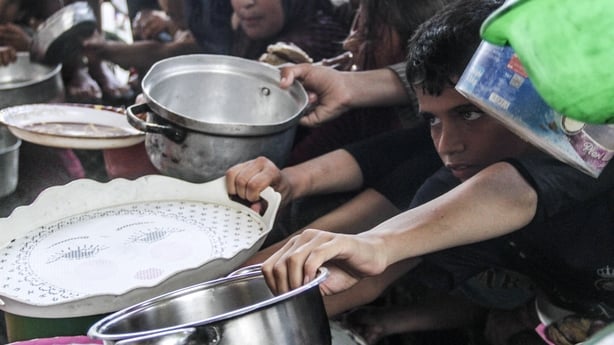
Footage shared on social media showed cars and houses on fire following the attacks.
The White House said late last night attacks by settlers on Palestinian civilians in the West Bank were "unacceptable and must stop".
The Israeli military said police and army units intervened and arrested one Israeli. It condemned the incident, which it said diverted security forces from other responsibilities. The military said it was examining reports about the death of the Palestinian.
Prime Minister Benjamin Netanyahu's office issued a statement saying he viewed the incident with "utmost severity".
"Those responsible for any offence will be apprehended and tried," it said.
Palestinians regularly accuse Israeli security forces of standing by and allowing groups of violent settlers to attack their houses and villages and the incidents have attracted increasing concern internationally.
The United States and several European countries have imposed sanctions on violent settlers and called repeatedly on Israel to do more to curb the attacks.

